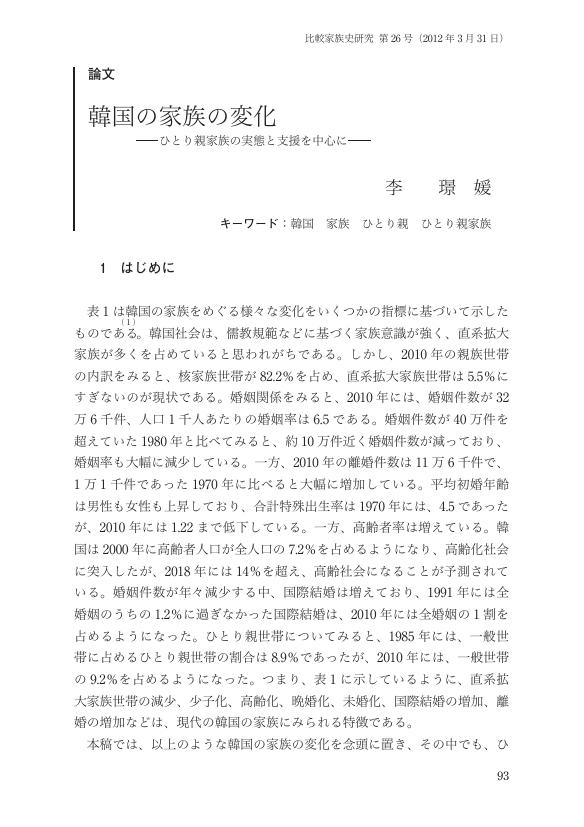3 0 0 0 OA しつけと虐待 未就学児の保護者調査に基づいて
- 著者
- 李 璟媛 山下 亜紀子 津村 美穂
- 出版者
- 一般社団法人 日本家政学会
- 雑誌
- 一般社団法人日本家政学会研究発表要旨集 63回大会(2011年)
- 巻号頁・発行日
- pp.155, 2011 (Released:2011-09-03)
【目的】虐待による子どもの死亡に対して「しつけのつもりだった」「しつけが過ぎた」と言い訳をし,しつけに対する各々の家庭の方法を正当化しようとする保護者が後を絶たない.そこで,本研究では,子育て中の保護者が子どもに対して行う様々な行為をどのように認識しているのかを,しつけと虐待という視点から検討することを目的とし,分析を行った. 【方法】2010年11月から2011年1月の間に宮崎市における6保育園と5幼稚園の協力を得て,保護者を対象に1,266部配布し,832部回収した(有効回収率65.7%).調査内容は,「大声で叱る」「お尻を叩く」「一室に閉じ込める」「学校に行かせない」などの26行為に対して,(1)子育て中に実際に行ったことがあるかどうか,(2)一般的にそれらの行為は「しつけと思うのか」「虐待と思うのか」,(3)それらの行為をしつけとして認識して行ったかどうか,などの項目で構成した. 【結果】(1)子育て中に実際に行った行為について,「ときどきある」と「何度かあった」を合わせて9割を超えたのは「大声で叱る」の1行為,6割を超えたのは,「お尻を叩く」「手を叩く」「頭を叩く」の3行為である.(2)一般的に(1)の行為は「しつけと思うのか」「虐待と思うのか」について,_丸1_「大声で叱る」「お尻を叩く」「手を叩く」の3行為については,6割弱の人が「しつけとして行ってよい」と考えており,_丸2_「頭を叩く」「泣いても放っておく」「車に子どもだけを乗せたままにする」については,5割の人が「どちらともいえない」と答えた.さらに_丸3_「虐待になる」が9割を超えたのは,「やけどを負わせる」「食事を与えない」「学校に行かせない」などの7行為であった.(3)(1)の行為について,実際に保護者がしつけとして行っている行為は,「大声で叱る」が最も多く,8割弱の保護者がそう答えている.次いで「手を叩く」が続き,5割を超える結果となった.
1 0 0 0 OA 韓国の家族の変化 —ひとり親家族の実態と支援を中心に—
- 著者
- 李 璟媛
- 出版者
- 比較家族史学会
- 雑誌
- 比較家族史研究 (ISSN:09135812)
- 巻号頁・発行日
- vol.26, pp.93-117, 2012-03-31 (Released:2013-03-31)
- 参考文献数
- 31
1 0 0 0 IR しつけと虐待に関する意識と実態 : 韓国の未就学児の親調査に基づいて
- 著者
- 李 璟媛 呉 貞玉 篠原 久枝
- 出版者
- 岡山大学大学院教育学研究科
- 雑誌
- 研究集録 (ISSN:18832423)
- 巻号頁・発行日
- no.172, pp.23-34, 2019
本研究の目的は未就学児を持つ親におけるしつけと虐待に関する意識と実態を明らかにすることである。2018 年9月から10 月の間に韓国の昌原市にある保育所などの協力を得て,500 部の質問紙を配布,271 人から有効回答を得た。本稿では母親238 人を分析対象とした。分析の結果,母親は,子どものことをよく理解し,子育てに充実感を感じており,子どものしつけは親の責任だと考えていることを確認することができた。子どものしつけに関しては配偶者と話し合っており,家族以外にも相談できる人がいるなど,母親の子育て環境は決して孤立しているわけではないと思われる。母親の多くは,しつけのための体罰は肯定するものの,それが子どもの心や体に傷を与える場合は虐待になると考えていた。また,母親の多くは,しつけに対して不安と悩みを抱えており,本稿では,自分のしつけ行為が虐待にあたるのではないかと考え,しつけと虐待のはざまで悩む母親の様子を確認することができた。
1 0 0 0 OA 大学生のひとり親家族のイメージ
- 著者
- 竹田 美知 李 璟媛 上野 顕子
- 出版者
- 一般社団法人 日本家政学会
- 雑誌
- 日本家政学会誌 (ISSN:09135227)
- 巻号頁・発行日
- vol.62, no.5, pp.317-328, 2011-05-15 (Released:2013-08-12)
- 参考文献数
- 13
- 被引用文献数
- 1
The number of one-parent families has been growing in Japan. One-parent families occur for different reasons. Some people are unmarried and are raising a family on their own, or they are separated or widowed.Many of these people suffer from social prejudice. The purpose of this research was focused on what variables are affecting university students’ opinions of one-parent families and to find out what their image is of single, separated or widowed parents with children.There are a number of variables: society’s opinion of single-parents; opinions on people with children who remarry; opinions on gender roles; experience of taking classes on gender studies; one-parent families as reflected by the mass media; opinions on the students’ future with regard to marriage and having children and how these affected students’ opinions of single-parents and opinions on gender roles.There are four images of single parents with children. They are as follows: that children in one –parent families might be more independent; that the parents and children might be less dependent on each other; that there might be less communication between parents and children; that parents and children might be more co-dependent. In Japan, the most positive image is represented by the latter.
1 0 0 0 OA しつけと虐待に関する認識と実態
- 著者
- 李 璟媛 山下 亜紀子 津村 美穂
- 出版者
- 一般社団法人 日本家政学会
- 雑誌
- 日本家政学会誌 (ISSN:09135227)
- 巻号頁・発行日
- vol.63, no.7, pp.379-390, 2012-07-15 (Released:2013-10-15)
- 参考文献数
- 31
- 被引用文献数
- 1
The purpose of this research is to reveal the recognition and the actual conditions of discipline and abuse.We received 832 effectual responses from questionnaires given to 1266 guardians of preschoolers between November 2010 and February 2011. 709 of these guardians were the mothers of preschoolers.The findings are as follows: 1. Over 80% of mothers recognize 10 actions as abuse: these include torturing children by burning them, not serving meals, and preventing children from going to school. 2. About 60% of mothers recognize the following actions as means of disciplining children: scolding their children loudly, spanking them, and slapping their children’s hands. 3. In fact, over 70% of mothers have scolded their children loudly, spanked them, and slapped their children’s hands as a way of disciplining them and over40% of mothers performed other actions in order to discipline their children. 4. Mothers who have not used childcare support services, or who are not part of an informal childcare network show a marked tendency toward recognizing scolding, spanking and slapping children as forms of discipline, rather than abuse.
